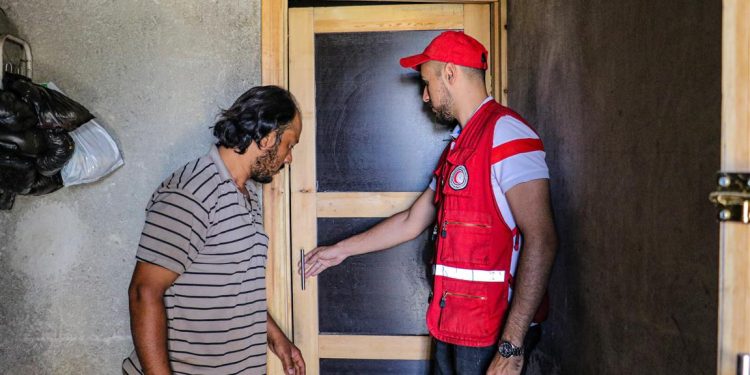In a windowless and doorless house, Maher and his wife breathed a sigh of relief, after a journey of displacement extended to 8 years. Today, he and his family are safe at home, but he needs a job opportunity to afford his family instead of depending on the humanitarian assistance that hardly keeps his three children alive.
During the Syrian crisis, Hosh Al-Zowahreh (Eastern Ghouta) witnessed painful events in that people had been forced out of their homes. Maher was one of them. In 2018, he returned to find his house uninhabitable, while the blacksmith tools, which used to be the source of his livelihood, were lost.
“When we came back, our house was in huge damage and cannot be rehabilitated. We had to stay in another house that was in miserable conditions. There were no doors or windows, no safe electrical extensions, or a sewer network. However, the Syrian Arab Red Crescent helped us rehabilitate the house and supported installing the electrical and sewers networks,” said Maher describing the moment of return.
“The house is safe and warm in winter,” added Maher expressing his relief that his three children will be fine. Nevertheless, Maher is deeply concerned about finding a job with a constant income to afford his children and ensure a better future for them.
The father was talking with grief while holding the school certificate of his elder son (10 Y) which proves the excellent performance of the child at school.
Maher is a professional blacksmith, an occupation that he inherited from his father. He missed the workshop that he lost, along with the tools, due to the crisis. He
couldn’t regain his self-employed job, and had no access to employment due to the injury he had that caused him a leg amputee.
The father and his children depend on the food parcels provided by SARC and the assistance from his brothers. He has registered in a livelihood grants program launched by SARC that could help him buy the needed blacksmith tools. In addition, he is attending the SARC-supported Prosthetics Center, where he receives proper treatment to improve his movement and ease pains.
His wife has never given up and is still keeping hope. With a big smile on her face, she said: “Everything will be better. I still remember when we had no windows or doors, and how I had to close the bathroom with a blanket to keep it warm. I can’t forget how the poor electrical extensions caused me electrical shock twice. However, everything is better today. I am so grateful and rest assured that everything will be fine.”
In Housh Al-Zwahera village, Maher’s family is an example of 300 families who got their houses renovated thanks to the Humanitarian Support Project that was jointly implemented by the Syrian Arab Red Crescent and the UNHCR to help the affected families.


